5.四六级听力常用句式和短语(小帅帅老师)
- 格式:doc
- 大小:83.50 KB
- 文档页数:18
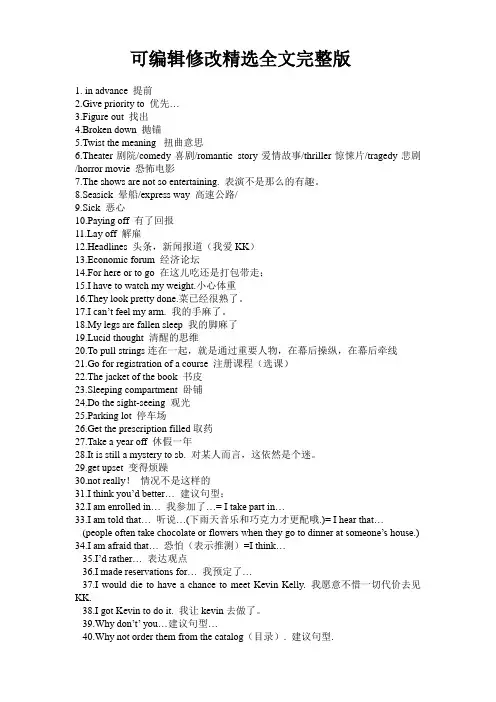
可编辑修改精选全文完整版1. in advance 提前2.Give priority to 优先…3.Figure out 找出4.Broken down 抛锚5.Twist the meaning 扭曲意思6.Theater剧院/comedy喜剧/romantic story爱情故事/thriller惊悚片/tragedy悲剧/horror movie 恐怖电影7.The shows are not so entertaining. 表演不是那么的有趣。
8.Seasick 晕船/express way 高速公路/9.Sick 恶心10.Paying off 有了回报y off 解雇12.Headlines 头条,新闻报道(我爱KK)13.Economic forum 经济论坛14.For here or to go 在这儿吃还是打包带走;15.I have to watch my weight.小心体重16.They look pretty done.菜已经很熟了。
17.I can’t feel my arm. 我的手麻了。
18.My legs are fallen sleep 我的脚麻了19.Lucid thought 清醒的思维20.To pull strings连在一起,就是通过重要人物,在幕后操纵,在幕后牵线21.Go for registration of a course 注册课程(选课)22.The jacket of the book 书皮23.Sleeping compartment 卧铺24.Do the sight-seeing 观光25.Parking lot 停车场26.Get the prescription filled取药27.Take a year off 休假一年28.It is still a mystery to sb. 对某人而言,这依然是个迷。
29.get upset 变得烦躁30.not really!情况不是这样的31.I think you’d better… 建议句型;32.I am enrolled in… 我参加了…= I take part in…33.I am told that… 听说…(下雨天音乐和巧克力才更配哦.)= I hear that…(peo ple often take chocolate or flowers when they go to dinner at someone’s house.)34.I am afraid that… 恐怕(表示推测)=I think…35.I’d rather… 表达观点36.I made reservations for… 我预定了…37.I would die to have a chance to meet Kevin Kelly. 我愿意不惜一切代价去见KK.38.I got Kevin to do it. 我让kevin去做了。
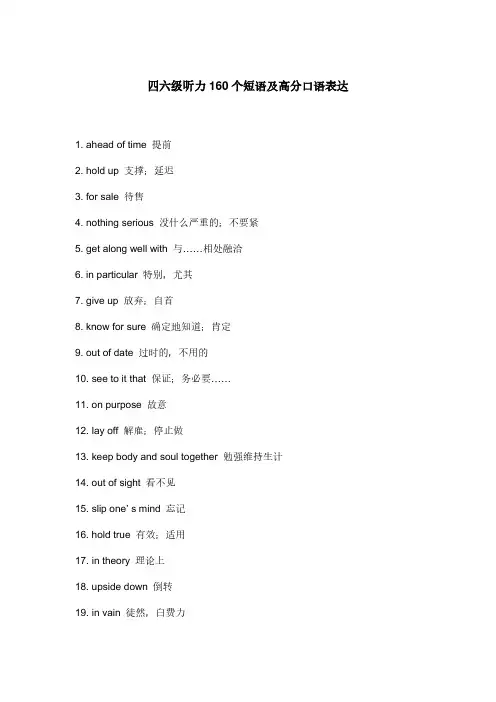
四六级听力160个短语及高分口语表达1. ahead of time 提前2. hold up 支撑;延迟3. for sale 待售4. nothing serious 没什么严重的;不要紧5. get along well with 与……相处融洽6. in particular 特别,尤其7. give up 放弃;自首8. know for sure 确定地知道;肯定9. out of date 过时的,不用的10. see to it that 保证;务必要……11. on purpose 故意12. lay off 解雇;停止做13. keep body and soul together 勉强维持生计14. out of sight 看不见15. slip one’ s mind 忘记16. hold true 有效;适用17. in theory 理论上18. upside down 倒转19. in vain 徒然,白费力20. in advance 预先,事先21. at the risk of 冒着……的危险22. out of work 失业23. safe and sound 安然无恙24. leave behind 遗留;把……撇在后面25. hand out 分发26. in person 亲自,本人27. stand for 代表;主张;容忍28. in the habit of 有……的习惯29. fall back on 借助于,投靠30. in spite of 不顾,不管31. keep track of 与……保持联系32. give sb. a ring 打电话给某人33. break the ice 打破僵局34. hold water 站得住脚;合情合理35. hang about 徘徊;闲逛36. keep company 陪伴37. lose face 丢脸38. as follows 如下39. if only 要是……就好了;但愿40. go Dutch 各自付费41. from time to time 有时;不时42. on vacation 度假43. white lies 善意的谎言44. in question 正在谈论45. leave alone 不打扰;让独自待着46. live on 靠……生活,以……为食物47. take pride in 以……自豪48. give birth to 生孩子;引起49. board the train 登上火车50. turn to 求助于,查阅51. break into tears/laughter 放声大哭/笑52. heart and soul 全心全意地53. in search of 寻找,寻求54. out of order 工作不正常的;不按次序55. make sure 查明;确保56. take... seriously 重视;认真对待57. back up 倒退,支持58. show off 炫耀;卖弄59. lay down 放下;规定60. account for 解释,说明,由于61. recover from 恢复;痊愈62. throw light on 使人了解,阐明63. without doubt 毫无疑问地64. on guard against 警惕;提防65. shut up 住口66. head for 朝……方向走去67. out of place 不适当的,格格不入的68. make efforts 作出努力69. let down 使失望;放下,降低70. no wonder 难怪71. rain or shine 不论晴雨;风雨无阻72. white elephant 贵而无用的东西73. make a fuss over 关爱备至;过分爱护74. in season 应时的,在旺季75. without exception 一律;无一例外地76. on one’ s own 独自;独立地77. on the spot 立即,当场78. in regard to/of 关于,就……而论79. keep one’ s promise 遵守诺言80. beyond hope 毫无希望81. hand on 把……传下去82. lose weight 减肥83. a case in point 有关的事例,例证84. by means of 用……,依靠……85. in addition 另外,加之86. hold one’ s breath 屏住呼吸87. use up 用完,用光88. keep in touch with 与……保持联系89. result in 结果是;导致90. no matter 不要紧,无关紧要91. keep in mind 记住92. when it comes to 一谈到……93. leave out 遗漏,省略;把……排除在外94. look out 留神;注意95. on the contrary 正相反96. in broad daylight 光天化日之下97. call it a day 今天到此为止98. wait in line 排队等待99. turn out 结果是;证明100. kill time 打发时间101. make ends meet 量入为出102. make no difference 没有差别;无动于衷103. in disguise 伪装,假扮104. lead to 导致;导向105. lose one’ s temper 发脾气,发怒106. keep secret 保密107. may as well 不妨;最好108. take after (在外貌等方面)与(父、母等)相像109. make fun of 取笑110. bring about 导致,引起111. on sale 廉价出售112. point out 指出113. on second thoughts 经重新考虑;一转念114. out of tune 不合调;走调115. give sb. a lift 让某人搭便车116. under arrest 被捕;禁闭117. in high spirits 兴致勃勃;兴高采烈118. run for 竞选119. pass away 消失;去世120. put up with 容忍,忍受121. take into consideration 考虑到,顾及122. sell out 售完123. out of stock 缺货;脱销124. walks of life 社会各界;各阶层人士125. make use of 利用126. set aside 留出,拨出(时间等);把……置于一旁127. go hungry 挨饿128. nothing but 只不过129. beyond reach 够不着;可望而不可及130. stick to 粘贴在……上;紧跟;忠于131. hang up 挂断(电话);悬挂132. pass on to 传递给133. put forward 提出(要求、事实等)134. have one’ s hands full 忙得腾不出手来135. mind one’ s own business 少管闲事136. ill at ease 局促不安137. make sense 讲得通,言之有理138. out of breath 喘不过气来139. pick up 拿起;学会140. out of print (书等)已售完的,已绝版的141. now that 既然,由于142. go into detail 详细叙述,逐一说明143. out of question 没问题,毫无疑问144. at ease with 对……感觉轻松145. take shelter 避难;避雨146. prior to 在……之前147. give in 认输,屈服;交上148. but for 要不是,如果没有149. be booked up 客满;(戏票等)已被预定一空150. last but not least 最后但同样重要的151. ring sb. up 打电话给某人152. keep an eye on 照看,留神,密切注意153. under the weather (身体)不舒服154. mistake... for 把……错认为155. on schedule 按时间表,准时156. out of fashion 过时157. strike the hour 整点报时158. break through 突围;取得突破性成就159. stand by 袖手旁观;坚持160. read between the lines 体会出字里行间之意。
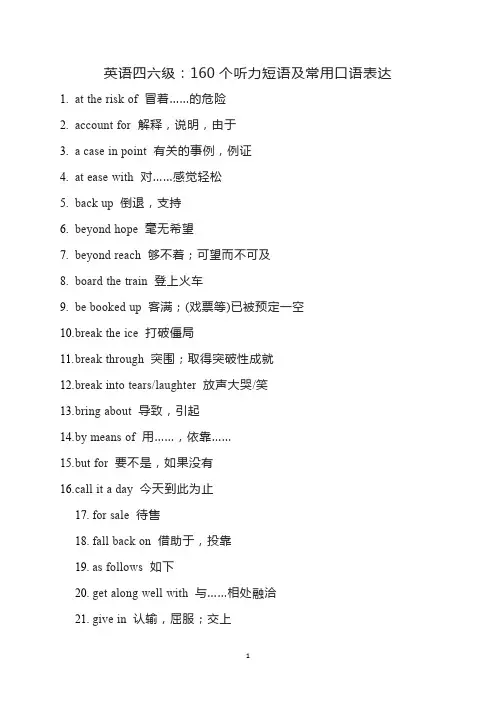
英语四六级:160个听力短语及常用口语表达1.at the risk of冒着……的危险2.account for解释,说明,由于3.a case in point有关的事例,例证4.at ease with对……感觉轻松5.back up倒退,支持6.beyond hope毫无希望7.beyond reach够不着;可望而不可及8.board the train登上火车9.be booked up客满;(戏票等)已被预定一空10.break the ice打破僵局11.break through突围;取得突破性成就12.break into tears/laughter放声大哭/笑13.bring about导致,引起14.by means of用……,依靠……15.but for要不是,如果没有16.call it a day今天到此为止17.for sale待售18.fall back on借助于,投靠19.as follows如下20.get along well with与……相处融洽21.give in认输,屈服;交上22.give up放弃;自首23.give sb.a lift让某人搭便车24.give sb.a ring打电话给某人25.on guard against警惕;提防26.give birth to生孩子;引起27.go Dutch各自付费28.go into detail详细叙述,逐一说明29.go hungry挨饿30.hang up挂断(电话);悬挂31.have one's hands full忙得腾不出手来32.hold one's breath屏住呼吸33.hold up支撑;延迟34.heart and soul全心全意地35.hand on把……传下去36.hand out分发37.hang about徘徊;闲逛38.head for朝……方向走去39.hold water站得住脚;合情合理40.hold true有效;适用41.if only要是……就好了;但愿42.in particular特别,尤其43.ill at ease局促不安44.in advance预先,事先45.in person亲自,本人46.in search of寻找,寻求47.in addition另外,加之48.in season应时的,在旺季49.in spite of不顾,不管50.in broad daylight光天化日之下51.in theory理论上52.in disguise伪装,假扮53.in vain徒然,白费力54.in high spirits兴致勃勃;兴高采烈55.in the habit of有……的习惯56.in question正在谈论57.keep an eye on照看,留神,密切注意58.keep track of与……保持联系59.keep body and soul together勉强维持生计60.keep in touch with与……保持联系61.keep one's promise遵守诺言62.know for sure确定地知道;肯定63.keep company陪伴64.kill time打发时间65.keep in mind记住66.keep secret保密st but not least最后但同样重要的y down放下,交出;规定y off解雇;停止做70.leave alone不打扰;让独自待着71.lead to导致;导向72.leave behind遗留;把……撇在后面73.leave out遗漏,省略;把……排除在外74.throw light on使人了解,阐明75.live on靠……生活,以……为食物76.lose face丢脸77.lose weight减肥78.let down使失望;放下,降低79.look out留神;注意80.make ends meet量入为出81.make sure查明;务必82.make a fuss over对……大惊小怪83.make use of利用84.make no difference没有差别;无动于衷85.mistake...for把……错认为86.make efforts作出努力87.make fun of取笑88.make sense讲得通,言之有理89.mind one's own business少管闲事90.no matter不管91.no wonder难怪92.nothing but的确;只不过93.now that既然,由于94.nothing serious没什么严重的;不要紧95.on one's own独自;独立地96.on purpose故意97.on sale廉价出售98.on schedule按时间表,准时99.on the contrary正相反100.on the spot立即,当场101.on vacation度假102.out of date过时的,不用的103.out of place不适当的,格格不入的104.out of fashion过时105.out of stock缺货;脱销106.out of work失业107.out of breath喘不过气来108.out of sight看不见109.out of tune不合调;走调110.out of question没问题,毫无疑问111.out of the question毫无可能的,绝对做不到的112.out of order工作不正常的;不按次序113.out of print(书等)已售完的,已绝版的114.pass on to传递给115.pass away消失;去世116.pick up拿起;学会117.point out指出118.prior to在……之前119.put forward提出(要求、事实等)120.put up with容忍,忍受121.rain or shine不论晴雨;风雨无阻122.read between the lines体会出字里行间之意123.run for竞选124.recover from恢复;痊愈125.result in结果是;导致126.ring sb.up打电话给某人127.stand by袖手旁观;坚持128.stand for代表;主张;容忍129.stick to粘贴在……上;紧跟;忠于130.see to it that保证;务必要……131.safe and sound安然无恙132.on second thoughts经重新考虑;一转念133.set aside留出,拨出(时间等);把……置于一旁134.show off炫耀;卖弄135.shut up住口136.slip one's mind忘记137.be sold out售完138.strike the hour整点报时139.take after(在外貌等方面)与(父、母等)相像140.take pride in以……自豪141.take shelter避难;避雨142.take...seriously重视;认真对待143.take into consideration考虑到,顾及144.lose one's temper发脾气,发怒145.turn out结果是;关掉146.turn to求助于,查阅147.ahead of time提前148.from time to time有时;不时e up用完,用光150.under arrest被捕;禁闭151.under the weather(身体)不舒服152.upside down倒转153.when it comes to一谈到……154.wait in line排队等待155.white lie善意的谎言156.white elephant贵而无用的东西157.walks of life社会各界;各阶层人士158.without doubt毫无疑问地159.may as well不妨;最好160.without exception一律;无一例外地161.with regard to关于,就……而论。
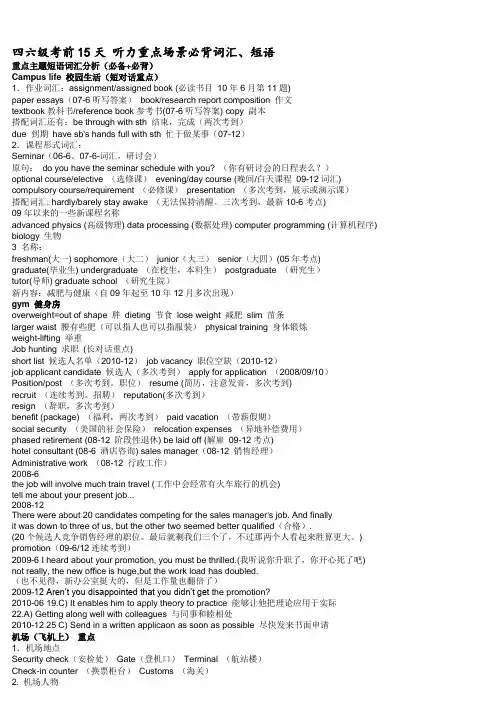
四六级考前15天听力重点场景必背词汇、短语重点主题短语词汇分析(必备+必背)Campus life 校园生活(短对话重点)1.作业词汇:assignment/assigned book (必读书目10年6月第11题)paper essays(07-6听写答案)book/research report composition 作文textbook教科书/reference book参考书(07-6听写答案) copy 副本搭配词汇还有:be through with sth 结束,完成(两次考到)due 到期have sb's hands full with sth 忙于做某事(07-12)2.课程形式词汇:Seminar(06-6、07-6-词汇,研讨会)原句:do you have the seminar schedule with you? (你有研讨会的日程表么?)optional course/elective (选修课)evening/day course (晚间/白天课程09-12词汇) compulsory course/requirement (必修课)presentation (多次考到,展示或演示课)搭配词汇: hardly/barely stay awake (无法保持清醒。
三次考到,最新10-6考点)09年以来的一些新课程名称advanced physics (高级物理) data processing (数据处理) computer programming (计算机程序) biology 生物3 名称:freshman(大一) sophomore(大二)junior(大三)senior(大四)(05年考点)graduate(毕业生) undergraduate (在校生,本科生)postgraduate (研究生)tutor(导师) graduate school (研究生院)新内容:减肥与健康(自09年起至10年12月多次出现)gym 健身房overweight=out of shape 胖dieting 节食lose weight 减肥slim 苗条larger waist 腰有些肥(可以指人也可以指服装)physical training 身体锻炼weight-lifting 举重Job hunting 求职(长对话重点)short list 候选人名单(2010-12)job vacancy 职位空缺(2010-12)job applicant candidate 候选人(多次考到)apply for application (2008/09/10)Position/post (多次考到。
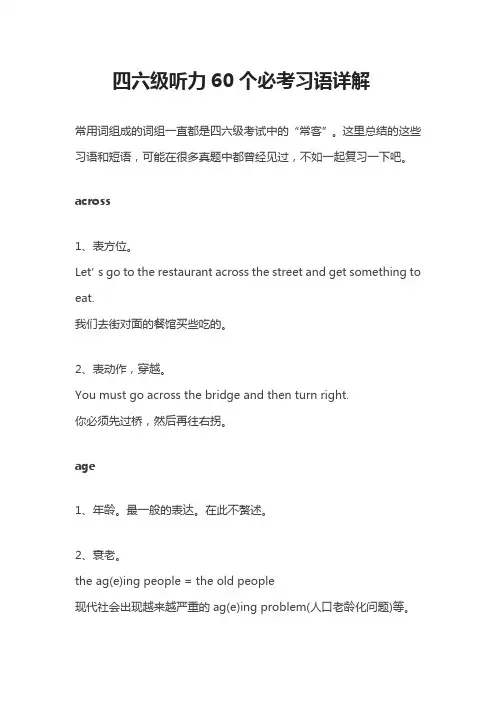
四六级听力60个必考习语详解常用词组成的词组一直都是四六级考试中的“常客”。
这里总结的这些习语和短语,可能在很多真题中都曾经见过,不如一起复习一下吧。
across1、表方位。
Let’s go to the restaurant across the street and get something to eat.我们去街对面的餐馆买些吃的。
2、表动作,穿越。
You must go across the bridge and then turn right.你必须先过桥,然后再往右拐。
age1、年龄。
最一般的表达。
在此不赘述。
2、衰老。
the ag(e)ing people = the old people现代社会出现越来越严重的ag(e)ing problem(人口老龄化问题)等。
1、shake all over 浑身颤抖2、all of a sudden 突然地All of a sudden, I remembered her name. 我突然想起了她的名字。
3、by all means 一定I'll come by all means. 我一定会来的。
4、all night long 整晚My present neighbor plays piano all night long. 我现在的邻居整晚都弹钢琴。
apply这里我们详细串联一下在听力考试中涉及到的与求职相关的短语。
apply for(申请),这是工作的第一步;既然要申请,必然需要递交letter of application(求职信),只要你足够confident about yourself,就有可能获得job interview(工作面试)的机会。
是否能够give a good impression(留个好印象)给主管,那就得看你个人造化了。
有些工作岗位会require much traveling(要求经常出差),还有些工作,做不了多久就会希望find a way out(找到出路)。
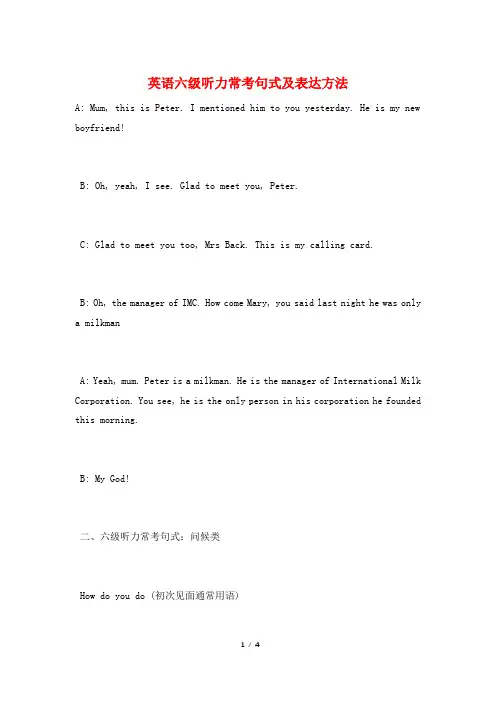
英语六级听力常考句式及表达方法A: Mum, this is Peter. I mentioned him to you yesterday. He is my new boyfriend!B: Oh, yeah, I see. Glad to meet you, Peter.C: Glad to meet you too, Mrs Back. This is my calling card.B: Oh, the manager of IMC. How come Mary, you said last night he was only a milkmanA: Yeah, mum. Peter is a milkman. He is the manager of International Milk Corporation. You see, he is the only person in his corporation he founded this morning.B: My God!二、六级听力常考句式:问候类How do you do (初次见面通常用语)How are you(比较熟悉的人之间用语)How are you getting along with...(你近来...可好)How are you doing(您工作还顺利吧)How is everything(一切还好吧)How is your vacation/holiday(s)/Christmas Day/weekend(假期怎么样) 当今美国社会流行口语用语,大致有:Whats up(近来可忙)HelloHiWhats going on (近来可好)How is lifeHow is it goinganything newPleased to meet you again!对以上问候的对答通常有How do you do! Fine!Thank you,and youEvery is fine!Im just great!Very(quite)well,thank you!Couldnt be better,thank you!Not bad!Cant complain!Just soso.值得一提的是,随着美语越来越广泛地渗透,听力中用美语朗读且以美国社会为背景的题材的趋势愈加明显。
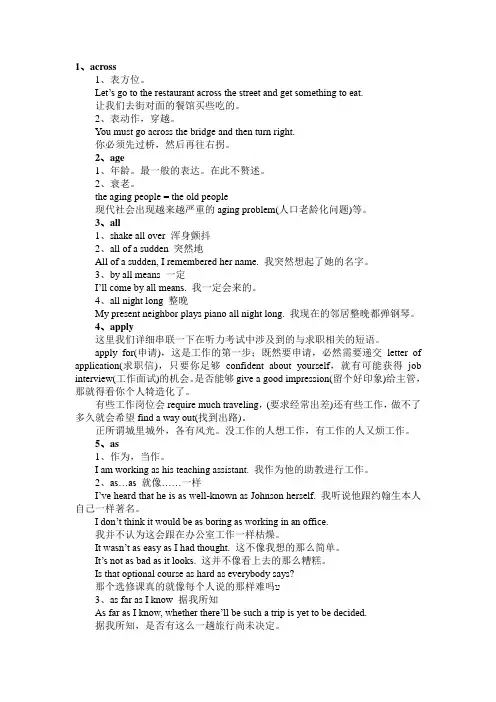
1、across1、表方位。
Let’s go to the restaurant across the street and get something to eat.让我们去街对面的餐馆买些吃的。
2、表动作,穿越。
You must go across the bridge and then turn right.你必须先过桥,然后再往右拐。
2、age1、年龄。
最一般的表达。
在此不赘述。
2、衰老。
the aging people = the old people现代社会出现越来越严重的aging problem(人口老龄化问题)等。
3、all1、shake all over 浑身颤抖2、all of a sudden 突然地All of a sudden, I remembered her name. 我突然想起了她的名字。
3、by all means 一定I’ll come by all means. 我一定会来的。
4、all night long 整晚My present neighbor plays piano all night long. 我现在的邻居整晚都弹钢琴。
4、apply这里我们详细串联一下在听力考试中涉及到的与求职相关的短语。
apply for(申请),这是工作的第一步;既然要申请,必然需要递交letter of application(求职信),只要你足够confident about yourself,就有可能获得job interview(工作面试)的机会。
是否能够give a good impression(留个好印象)给主管,那就得看你个人犄造化了。
有些工作岗位会require much traveling,(要求经常出差)还有些工作,做不了多久就会希望find a way out(找到出路)。
正所谓城里城外,各有风光。
没工作的人想工作,有工作的人又烦工作。
5、as1、作为,当作。
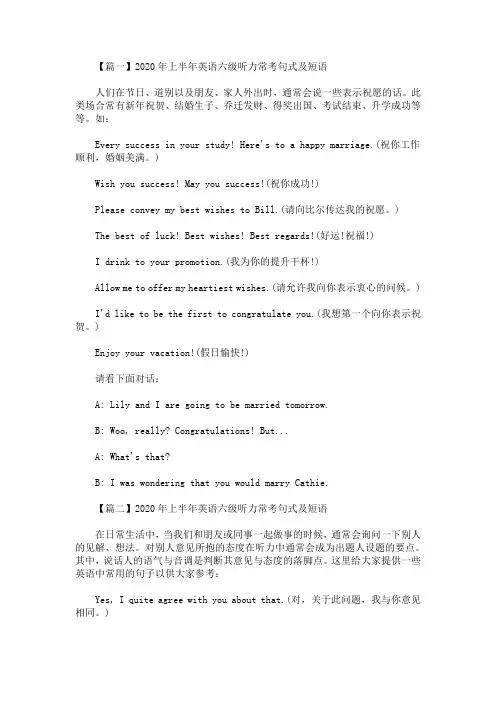
【篇一】2020年上半年英语六级听力常考句式及短语人们在节日、道别以及朋友、家人外出时,通常会说一些表示祝愿的话。
此类场合常有新年祝贺、结婚生子、乔迁发财、得奖出国、考试结束、升学成功等等。
如:Every success in your study! Here's to a happy marriage.(祝你工作顺利,婚姻美满。
)Wish you success! May you success!(祝你成功!)Please convey my best wishes to Bill.(请向比尔传达我的祝愿。
)The best of luck! Best wishes! Best regards!(好运!祝福!)I drink to your promotion.(我为你的提升干杯!)Allow me to offer my heartiest wishes.(请允许我向你表示衷心的问候。
)I'd like to be the first to congratulate you.(我想第一个向你表示祝贺。
)Enjoy your vacation!(假日愉快!)请看下面对话:A: Lily and I are going to be married tomorrow.B: Woo, really? Congratulations! But...A: What's that?B: I was wondering that you would marry Cathie.【篇二】2020年上半年英语六级听力常考句式及短语在日常生活中,当我们和朋友或同事一起做事的时候,通常会询问一下别人的见解、想法。
对别人意见所抱的态度在听力中通常会成为出题人设题的要点。
其中,说话人的语气与音调是判断其意见与态度的落脚点。
这里给大家提供一些英语中常用的句子以供大家参考:Yes, I quite agree with you about that.(对,关于此问题,我与你意见相同。
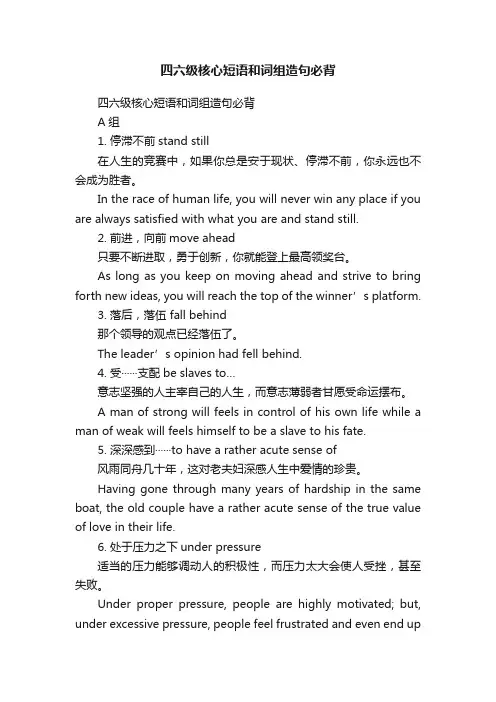
四六级核心短语和词组造句必背四六级核心短语和词组造句必背A组1. 停滞不前stand still在人生的竞赛中,如果你总是安于现状、停滞不前,你永远也不会成为胜者。
In the race of human life, you will never win any place if you are always satisfied with what you are and stand still.2. 前进,向前move ahead只要不断进取,勇于创新,你就能登上最高领奖台。
As long as you keep on moving ahead and strive to bring forth new ideas, you will reach the top of the winner’s platform.3. 落后,落伍 fall behind那个领导的观点已经落伍了。
The leader’s opinion had fell behin d.4. 受······支配be slaves to…意志坚强的人主宰自己的人生,而意志薄弱者甘愿受命运摆布。
A man of strong will feels in control of his own life while a man of weak will feels himself to be a slave to his fate.5. 深深感到······to have a rather acute sense of风雨同舟几十年,这对老夫妇深感人生中爱情的珍贵。
Having gone through many years of hardship in the same boat, the old couple have a rather acute sense of the true value of love in their life.6. 处于压力之下under pressure适当的压力能够调动人的积极性,而压力太大会使人受挫,甚至失败。
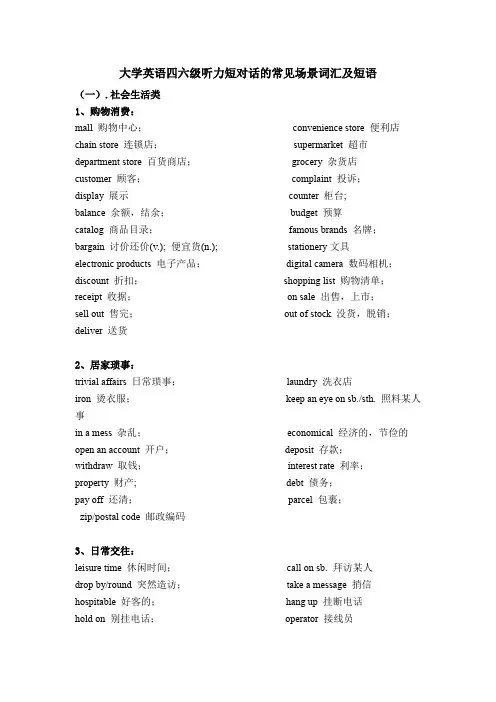
大学英语四六级听力短对话的常见场景词汇及短语(一).社会生活类1、购物消费:mall 购物中心;convenience store 便利店chain store 连锁店;supermarket 超市department store 百货商店;grocery 杂货店customer 顾客;complaint 投诉;display 展示counter 柜台;balance 余额,结余;budget 预算catalog 商品目录;famous brands 名牌;bargain 讨价还价(v.); 便宜货(n.); stationery文具electronic products 电子产品;digital camera 数码相机;discount 折扣;shopping list 购物清单;receipt 收据;on sale 出售,上市;sell out 售完;out of stock 没货,脱销;deliver 送货2、居家琐事:trivial affairs 日常琐事;laundry 洗衣店iron 烫衣服;keep an eye on sb./sth. 照料某人事in a mess 杂乱;economical 经济的,节俭的open an account 开户;deposit 存款;withdraw 取钱;interest rate 利率;property 财产; debt 债务;pay off 还清;parcel 包裹;zip/postal code 邮政编码3、日常交往:leisure time 休闲时间;call on sb. 拜访某人drop by/round 突然造访;take a message 捎信hospitable 好客的;hang up 挂断电话hold on 别挂电话;operator 接线员4、休闲娱乐:hobby 爱好;keep pets 养宠物;tame dog 训狗gardening 园艺;play chess 下象棋TV channels 电视频道;broadcast 广播,播放live broadcast 现场直播;programme 电视节目commercial advertisement 商业广告tennis court 网球场;performance 表演entertainment industry娱乐业;comedy 喜剧tragedy 悲剧;horror movie 恐怖片;plot 情节entertaining 有趣的,愉快的;enthusiastic 热情的5、外出就餐:waiter/waitress 男女服务员;napkin 餐巾order 点菜;tip 消费;menu 菜单;snack 快餐dessert 甜点;appetizer 开胃菜;yogurt 酸奶toast 烤面包;junk food 垃圾食品;roast 烤肉beef steak 牛排;rare 半熟的;medium 中等熟的sour/sweet/bitter/hot 酸甜苦辣go dutch AA制;treat 款待,宴请make a reservation 预定;have a picnic 野餐6、住房搬家:landlord/landlady 房东;tenant 房客apartment/flat 公寓;residence 居住,住所monthly rent 月租;spare rooms 空余房间available 可利用的;accommodate 供给住宿或房间settle 定居;downtown 市中心;suburb 郊区neighborhood 邻近地区;transportation 交通subway entrance 地铁入口;put up with the noise 容忍噪音7、装饰维修:furnished 已装修的;furniture 家具decoration 装饰;painting 画;cupboard 衣柜shower 淋浴;sink 下水槽;pipe 管道;leak 漏水fix 维修;install 安装;maintenance man/technician 维修工air conditioner 空调(二).学校生活类1、注册:register 注册,报到,登记;enrolment 登记入学department 系;student ID card 学生证recommendation letter 推荐信;application form 申请表2、选课:semester 学期;register for/sign up for/enroll in/take 选课quit/drop a course 退课;earn a credit 修学分major in 主修;required /compulsory course 必修课optional/elective course 选修课curriculum 课程;linguistics 语言学;philosophy 哲学;psychology 心理学;literature class 文学课3、听课:professor 教授;supervisor/advisor 导师lecturer 讲师;tutor 家教;dean 系主任teaching assistant 教学助理call the roll 点名;catch/follow 跟上make a presentation 作陈述或介绍confused/puzzled 迷惑不解的;get lost 不明白attendance 出席人数;presence 出席absence 缺席;punctual 守时,准时take notes 记笔记;skip the class 逃课make up…弥补(课)4、作业:assignment/homework 作业;experiment 实验survey 调查;rough draft 草稿;final draft 终稿have one’s hands full with… 忙于做…due 到期;deadline 最后期限;criticism 批评feedback 反馈5、读书:journal 定期刊物;magazine 杂志;periodical 期刊;book review 书评;editorial 社论;go through this novel 通读小说out of stock 已脱销;out of print 已绝版up-to-date 最近的,当代的;publisher 出版者reference book 参考书;publication 出版,出版物;publishing house 出版社6、学习:concentrate 集中精神;distraction 使人分心的事review/revise 复习;fall behind 落后;think much /highly of…对…评价很高7、考试、成绩:mid-term exam 期中考试;final exam 期末考试quiz 小测验;pop quiz 突击测验;standardized tests 标准测试; national test 统考entrance exam 入学考试;review/go over/go through 复习;grade/score/mark 成绩;full marks 满分passing grade 及格分;straight A’s 全得A,全优B plus B加; B minus B减;repeat the course 重修;repeat the year 留级8、毕业进修:graduation 毕业;graduate 毕业生;post graduate 研究生;diploma 文凭;a bachelor’s degree 学士学位; a master’s degree 硕士学位;a doctor’s degree 博士学位;further/advanced study 进修;study abroad 留学9、学费及奖学金:tuition 学费;fee 学杂费;grant 助学金;financial aids 助学金;scholarship 奖学金student loan 学生助学贷款10、课余生活:participate in/take part in 参加;enroll in 登记sign up for 参加(俱乐部,课程等);taste 兴趣,爱好;run for 竞选;vote 选票questionnaire 问卷调查; election campaign 选举活动;the student union 学生会;chairman 主席candidate 候选人(三)、求职面试1、求职面试job hunting 找工作;want ads 招聘广告position/post 职位;opening/vacancy 空缺opportunity 机会;inquiry 询问;consult 咨询resume 简历;application form 求职信interview 面试;interviewee 面试者interviewer 面试官;competent 胜任的inexperienced 没有经验的;qualification 资历unemployment 失业;lose one’s job 失业full-time job 全职工作;part-time job 兼职工作do odd jobs 做零工;fire/dismiss 解雇hire/employ 雇佣;job-hopping 跳槽appointment 任命;turn down 拒绝2、工作往来:clients 客户;secretary 秘书;colleague 同事superior 上司;get along with 与…相处appointment 约会;confirm 确认ask for leave 请假;arrangement 安排apply for a vacation申请休假;fill in the application form 填写申请表morning shift 早班;night shift 夜班shift work 倒班工作;take over 接管,接任in charge of 负责;be involved in 参与assistance/favor 帮助,协助;negotiate 谈判inquire 咨询;cooperation 合作competition 竞争;bid 投标;contract 合同difference 分歧;approve 同意,批准disapprove 反对;compromise 妥协,让步headquarter 总部;branch 分部,分公司3、工作态度:attitude 态度;personality 品质active/positive 积极的;optimistic 乐观的pessimistic 悲观的;determined 有决心的forgetful 健忘的;diligent 勤奋的confident 有信心的;hard-working 工作努力的perseverance 坚持不懈;struggle 奋斗overwork 加班;work addict 工作狂overwhelmed 疲倦的;workload 工作负担wear out 疲劳的;complain 抱怨work like a horse 辛勤工作;devote oneself to sth. 致力于…4、工作业绩:promotion 升职;career 事业achievement 成就;contribution 贡献deserve 值得,应得;worthy 值得的(四).科普知识类1、生物,生态:biology 生物学;cell 细胞;protein 蛋白质gene 基因;inherit 遗传;survive 生存digestive system 消化系统;adapt to 适应ecology 生态学;soil erosion 水土流失rare animal 珍稀动物;extinction 灭绝2、气候:weather forecast 天气预报;temperature 温度Sunny/clear 晴天;cloudy 多云的overcast 阴天的;drizzle 毛毛雨;light rain 小雨heavy rain 大雨;shower 阵雨pour/downpour 倾盆大雨;thunderstorm 雷雨rain cats and dogs 下倾盆大雨;blizzard 暴风雨snowstorm 暴风雨;hail 冰雹;windy 刮风的breeze 微风的;sweltering 酷热的steamy 湿热的;sticky 闷热的;stuffy 闷的muggy 闷热潮湿的;chilly 严寒的freezing 寒冷的;frigid 严寒的severe winter 严冬;foggy/misty 有雾的humid 湿的;humidity 湿度3、天文地理:astronomy 天文学;universe 宇宙cosmos 宇宙;solar system 太阳系solar energy 太阳能;satellite 卫星planet 行星;comet 彗星;telescope 望远镜microscope 显微镜;geology 地质学geography 地理;exploration 勘探north Pole 北极;South Pole 南极equator 赤道;latitude 纬度;longitude 经度iceberg 冰山;volcano 火山;erupt 爆发4、现代科技:high tech 高科技;clone 克隆portable computer 手提电脑;Internet 因特网websites 网址;cyber 网络;log in/on 登陆hacker 黑客;computer virus 电脑病毒chat room 聊天室;on-line shopping 在线购物surf on the internet 在网上冲浪;distance learning 远程学习;fax machine 传真机;advance technology 先进技术;printer 打印机copying machine 复印机photocopying machine 影印机(五)、社会问题类1、环境问题environment protection 环境保护;reclaim 开垦;deforestation; 滥砍滥伐over-fishing 过渡捕鱼;dump 倾倒; ecosystem 生态系统;vegetation 植被; oxygen 氧气;ozone layer 臭氧层; deterioration 恶化;pollution 污染; recycle 回收再利用;circulation 流通,循环; purify 净化;radiation 辐射; drought 干旱;dust-storm 沙尘暴;acid rain 酸雨;greenhouse effects 温室效应;global warming 全球变暖;rare 稀有的;sensitive to climate;对气候敏感的; endangered species 濒危物种; wipe out 清除,消亡;extinction 灭绝; conservation 保护,保存;2、移民种族:industrial Revolution 工业革命;famine 饥饿refugee 难民;migrate 移民;immigration 移民;settlement 定居;cultural conflict 文化冲突;diverse 多样的;multiculturalism 多元化文化主义;descendant 后代,后裔;racial segregation 种族隔离;racial discrimination 种族歧视;3、妇女问题:women’s liberation 妇女解放;sex discrimination/sexism性别歧视;women’s movement 妇女运动;professional women 职业女性;domestic violence 家庭暴力;traffic in women 贩卖妇女;abuse 虐待compensate 补偿;divorce 离婚4、政治经济:international organizations 国际组织non-governmental organizations 非政府组织economic sanctions 经济制裁; economic recession 经济衰退;economic depression 经济萧条;reform 改革;crisis 危机;institution 机构;alliance 联盟;cooperation 合作;politics 政治;(anti-) dumping (反)倾销deficit 赤字;legislation 立法;merge 并购,合并;judicial 司法的;listed company 上市公司;executive 行政的subsidiary 子公司;parliament 国会;the Congress 国会(美);bankrupt 破产;the Secretary of State 国务卿the State Council 国务院break out 爆发;summit meeting 峰会;internal affairs 内政;rebel 暴乱;terrorism 恐怖主义;strike 罢工;CEO (chief executive officer)首席执行官GDP (gross domestic product)国内生产总值GNP (gross national product) 国民生产总值(六)、文化习俗类1、文化艺术:mass media 大众媒体;cartoon/animation动画片musical 音乐片;Academy Award 金像奖fashionable 时尚的;outmoded/outdated 过时的popular with 流行;catch on 流行;Yuppie 雅皮士;Hippie 嬉皮士;classical literature 古典文学;art works 艺术作品collected works 文集;collection 作品集,收藏品aesthetic 美学的;graffiti 涂鸦;oil painting 油画;sculpture 雕塑;dignity 尊严;individual 个人的;confrontation 冲突;offensive 冒犯的;(musical) instrument 乐器;concert 音乐会wind instrument 管乐;folk art 民间艺术stringed instrument 弦乐;performance 表演;orchestra/band 乐队;classic art 高雅艺术;2、社会习俗:exotic 有异域情调的;custom 风俗;costume 服饰;proper conduct 得体的举止good-mannered 文明的;taboo 禁忌;ill-mannered 无教养的;behavior 行为;blunt 唐突,直言的;practice 惯例;tradition 传统;bridegroom/groom 新郎;wedding ceremony 婚礼庆典;bride 新娘;bridesmaid 伴娘;best man 伴郎;engagement 订婚;(七)、旅游交通类:1、火车track 轨道;express train 快车;a non-stop/through train 直达火车;stopping train/slow train 慢车;change/transfer 转车、换乘;schedule/timetable 时刻表;car/train attendant 列车员;booking/ticket office 订票处;information booth 问讯处;passenger 乘客coach/carriage 车厢;sleeping car 卧车车厢berth/bunk 铺位;restaurant/dining car 餐车;platform ticket 站台票;one-way ticket 单程票return/round-trip ticket 往返票left-luggage office 行李暂存处;check (in) luggage 托运行李;punch a ticket 剪票refund a ticket 退票;terminal/terminus 终点站to change trains at… 在(某地)换车the train is due at…在(某时)到达to break the journey 中途下车2、汽车commuter 通勤者;rush hour (车辆的)高峰时间zebra 斑马线;traffic jam 交通拥挤;jay-walker 乱穿马路的行人;handbrake手刹车;park a car 停车;hold up 阻塞,抑制;run a red light/jump the light 闯红灯;over taking on the inside 超车;speeding 超速;make a wrong turn 拐错弯;drunken drinking 酒后驾车;casualties 伤亡人数hit-and-the-run accident 事故后驾车逃逸one way street 单行道;intersection 十字路口;driver’s/driving license驾驶执照;shuttle 班车give a ride 搭车;fast lane 快行车道;injury 受伤;ticket 罚单;3、飞机Airport 机场;declare 申报(海关、纳税)airline 航线;customs 海关;flight 航班;board 登机;economy class 经济舱;checking counter 检票处first class 头等舱;passport 护照;business class 商务舱;visa 签证;see off 送行;air/plane crash 空难;departure time 起飞时间;miss flight 误机;check in 办理登机手续;safety inspection 安检;crew 全体乘务人员;behind schedule 晚点;captain 机长;airsick 晕机;pilot 飞行员;jet lag 飞机时差反应;switch to a different flight 换乘其他航班4、参观游览tourist 游客;take a vacation 休假;sightseeing 观光、游览;travel agency 旅行社;book a room 预订房间;reception desk 接待处;service counter 服务台;check in 住宿登记;check out 结账离开;scenic resort 旅游胜地;historic spots 历史名胜;landscape 风景;fantastic scene 奇异的景象;pose 摆姿势;beyond description 难以描述;press the shutter 按快门;run out of film 胶卷用完了;broaden one’s horizon 开拓眼界;(八)、医疗健康类1、疾病和症状Epidemic 流行病;bird flu 禽流感;SARS 非典型性肺炎;contagion 传染;symptom 症状;attack/fit 发作;sneeze 打喷嚏;coughing 咳嗽;runny nose 流鼻涕;nausea 恶心;vomit 呕吐;diarrhea 腹泻;stomachache 胃痛;cavity 牙洞;toothache 牙疼;dental decay 龋齿;allergy 过敏;fracture 骨折;fatigue 疲劳;sore throat 嗓子疼;have a temperature/fever 发烧;2、医院和医生infirmary 学校医院;clinic 诊所;the dentist’s 牙科诊所;physician 内科医生registration office 挂号处;surgeon 外科医生out-patient department 门诊部;ward 病室;in-patient department 住院部;anesthetist 麻醉师;pharmacist 药剂师;head nurse 护士长;doctor in charge 主治医师3、检查和治疗Register 挂号;make a file 建病例;Examine 检查;take temperature 量体温;Take blood pressure 量血压;treat 治疗;Physical inspection 体检;cure 治愈;Prescription 处方,药方;fill teeth 补牙;Herb/herbal medicine 草药;drug 药;Pill/tablet 药片,药丸;dosage 剂量;sleeping pill/tablet;pharmacy 药房drugstore/chemist’s shop 药店,药房;take injection 打针;vaccinate 注射疫苗;be in hospital 住院;be out of hospital 出院;operation 手术;surgery 外科手术;go for the admission procedure 办理住院手续;4、减肥锻炼put on weight 增加体重;overweight 超重的aerobics 有氧健身法;lose weight 减肥;keep-fit class 健身房;fitness center 健身中心physical exercise 锻炼;slimming drug 减肥药;exercise machine 健身器械;on diet 节食;go in for physical training锻炼体魄;build up a good physique 锻炼身体;5、不良习惯tobacco 烟草(制品);addict 使沉溺或上瘾;tar 焦油;nicotine 尼古丁;lung cancer 肺癌;heavy smoker 烟瘾大的人;give up/stop/quit smoking 戒烟;give up/stop/quit drinking 戒酒;6、身体状况Physical examination、health checkup 体检;be of strong physique/powerful build 体格强壮;be in good/bad shape 身体健康/身体状况好;be as fit as a fiddle 身体非常好;be in poor health 身体虚弱;be/feel under the weather 身体不舒服;be out of shape 身体不好;。
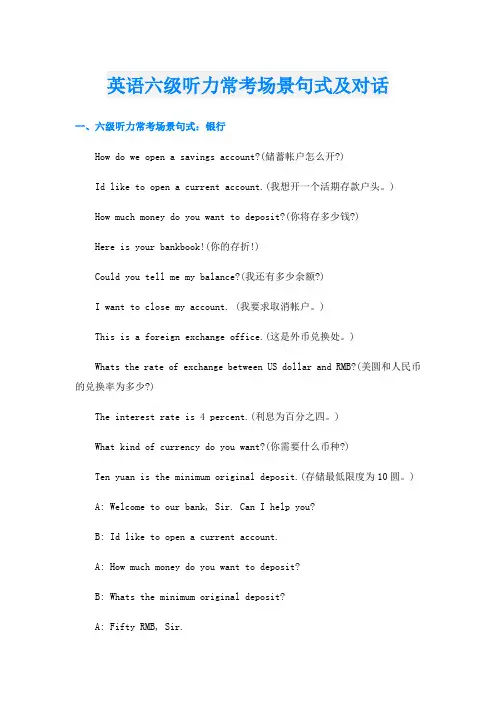
英语六级听力常考场景句式及对话一、六级听力常考场景句式:银行How do we open a savings account?(储蓄帐户怎么开?)Id like to open a current account.(我想开一个活期存款户头。
)How much money do you want to deposit?(你将存多少钱?)Here is your bankbook!(你的存折!)Could you tell me my balance?(我还有多少余额?)I want to close my account. (我要求取消帐户。
)This is a foreign exchange office.(这是外币兑换处。
)Whats the rate of exchange between US dollar and RMB?(美圆和人民币的兑换率为多少?)The interest rate is 4 percent.(利息为百分之四。
)What kind of currency do you want?(你需要什么币种?)Ten yuan is the minimum original deposit.(存储最低限度为10圆。
) A: Welcome to our bank, Sir. Can I help you?B: Id like to open a current account.A: How much money do you want to deposit?B: Whats the minimum original deposit?A: Fifty RMB, Sir.B: Ok, how about the interest?A: 6 percent for current deposit.B: Umm, I see, and I need to think about it...二、六级听力常考场景句式:医院I have a bad cough and my chest aches.(我咳嗽得厉害并且胸口疼。
【导语】世上的事,只要肯⽤⼼去学,没有⼀件是太晚的。
你只要记住你的今天⽐昨天进步了⼀点,那么你离你的梦想也就更近了⼀步。
以下为“2021年上半年英语六级听⼒常考短语及句式”,欢迎阅读参考!更多相关讯息请关注⽆忧考!【篇⼀】2021年上半年英语六级听⼒常考短语及句式 有聚总有散。
告别情景的设置往往并⾮简单、直接地告别,常伴随着理由、托辞等。
直接的告别话语有: Good bye!(Byebye! Bye!) See you (tomorrow)! See you later! So long! Farewell! 委婉的告别辞有: I'd like to say goodbye to everyone. I'm afraid I must be going now. I'm calling to say goodbye. 其他带有祝愿以及叮嘱等的告别辞有: I'll look forward to seeing you soon. Let's hope we'll meet again. Hope to see you again. Drop in anytime you like. Mind how you go,bye! Take care of yourself,and don't forget to keep in touch. Do keep in touch! My regards to your family. A pleasant journey to you! I'll miss you! Be Good! 这种表达⽅式与中国⼈的⽇常⾔谈颇为相似,所以有时不妨可作⼤胆推测。
请在下⾯的对话中对此加以体会: M: I'm afraid I've got to go now。
W: Can't you stay just another minute? M: Oh,dear,I really have to... W: Ok,take care of yourself,and I will miss you.Bye! M: Bye!...【篇⼆】2021年上半年英语六级听⼒常考短语及句式 ⽇常问候⽤语是考⽣必须熟练运⽤的知识,这与考⽣的⼝语操练有很⼤关系。
四六级听力常用句式和短语@李霄虹老师对以往试题的分析表明,四六级考试听力部分所涉及的题材句式都比较有限,我们完全可以通过熟悉相关的句式来间接地为听力部分做准备。
我们归纳总结了以下几个部分,应该说大部分都是读者们比较熟悉的了,但是一定不要因为看上去比较熟就不去重视它们, 不信的话你简单的做一个自我测试就知道了: 现在找一支笔, 用英文从一写到二十, 然后找本字典, 检查一下自己写错了几个.也许你只是拼错了一两个字母, 但是在听力考试中间,答案拼错一个字母跟完全没有听懂回答错误是一样的. 对这些本来已经熟悉的东西, 一定要掌握的准确无误才行.一、数字表达类(Numbers)听力试题中所考察的题目很大一部分是根据所听内容填写诸如数字、时间和地点等具体信息。
而数字、时间等信息正是中国考生最不容易听清楚的。
下面我们将数字、时间等英语语言信息的日常表达方法介绍给大家:1.英语中纯数字的表达方法大于100的数字:101 one hundred (and ) one200 two hundred998 nine hundred ( and ) ninety eight在英语中上面括弧中的and 一般不能省略;而在美国英语中却往往省去。
请分析下面的对话:A:How many people are killed in the terrorists' attacking at America?B: That's nine hundred and ninety eight, exactly.A: Woo, you must be joking. How can you get such an accurate number?B: Ha, ha... surely I am joking. You silly goose.大于1000的数字:1001 a/one thousand (and) one2232 two thousand two hundred (and) thirtytwo900,732,266,043nine hundred billion seven hundred thirty two million two hundred sixty six forty three英语中一千以上数字的表达方法是以三位数为单元,从高到低billion,million,thousand 而依次读出的。
Day 252016.04.25三十一、laundry该词本意是指洗衣店。
但是在听力中,会用来借指洗衣服的工作。
比如,There’s a lot of laundry to do.有很多衣服要洗。
三十二、look该词本身作为一个基本动词并无什么难度,但是它频频在听力中出现的各种用法我们不得不掌握一下。
1、看上去。
You look great. 你看上去气色很好。
You look awfully nervous.你看上去很紧张。
All of my clothes look so old and I can’t afford something new.我所有的衣服看上去都很旧,我买不起新的。
It’s not as bad as it looks.它并没有看上去的糟。
2、查阅。
look up 查阅字典3、希望。
look forward to4、寻找。
look forDo you think we should try to call him or look for him?你认为我们是打电话给他呢,还是去找他?Have you seen a young gentleman looking for his wristwatch?你见过一个寻找腕表的年轻人吗?三十三、make1、make an appointment 预约Why didn't you make an appointment to see the doctor last week?你为什么上周不给医生打个预约电话。
2、make a call on the payphone 打一个收费电话3、make room for sb 腾出位子给某人Could you make room for the old lady?你能为这位老太太让个座吗?4、make it 达到,抵达,做到But I’m afraid I can’t make it.但是我恐怕做不到。
英语四六级听力讲座类备考技巧以及常见短语首先,要集中精力听准文章的开头部分。
在每篇讲座开始之前都会对整篇讲座内容作简短的开篇介绍,一般为一句话:Listen to part of the lecture in X class, the professor is talking about Y. 这里的X——学科名称,以及Y——主要内容,相当于给讲座内容指出了一个大的方向。
正式讲座开始后,先要注意听其主题,大多数的教授都会在课程开始时开门见山,点明主题,例如:Today we will talk about…或者Today we will focus on…, on 或者about 后面的内容要重点把握,这就是整篇文章的核心内容,可以帮助我们迅速抓住文章的主题。
其次,在抓住英语文章主题后,对可能听到的内容进行积极预测。
把握文章 主题之后,要立刻集中精力抓住段落中的关键词和核心概念,迅速激活自己在该 学术领域的相关知识,对可能听到的内容进行合理预测。
例如:如果讲座将介绍 火山的相关知识,那么应该迅速预测接下来可能会听到火山的分类、不同类别火 山的喷发时间、所在地点以及危害性等等。
这样带有“主动性”的去听,会对理 解文章内容有很大帮助。
当然,这种主动预测的能力是要建立在平时多听、多总 结、多积累的基础之上的。
第三,抓住要点记听力笔记。
记笔记是英语六级听力的必修课。
讲座文章篇 幅较长,也就是所包含的信息量较大,而文章的后面又会考察我们一些细节信息。
在这种情况下,光凭大脑记忆是绝对不够的,必须拥有边听边记笔记的能力才能 应对后面的题目。
在记笔记时,要重点把握文章的一些细节信息点,例如:时间、 名词、举例等等。
对重要细节信息点要做到熟悉、敏感,并且可以迅速记录。
完 善的笔记能力需要长期的训练,在平时练习的过程中,要养成边听边记笔记的习 惯,摸索笔记的规律,不断总结形成自己的缩写及笔记符号系统。
第四,利用上下文猜测生词词义。
四级听力长对话的常用词汇/短语及句型按照以上分类我们来总结一下四级听力长对话的常用词汇/短语及句型。
1.工作类大学英语教学突出实用性,即让学生毕业后能在实际工作中自如地运用英语进行交流。
大学英语四级的听力考试也正是突出了这一特点,所以涉及工作的话题颇多,但是很少谈论具体工作细节,大都是日常的工作情况,请大家注意这方面语料的积累,在取得好成绩的同时,也进一步提高自己的实际英语应用能力。
整理历年的四级真题,我们发现2006、2007、2008、2009、2010年都出现了关于工作的话题,应该引起考生的重视。
总结经常出现的相关词汇/短语如下:be responsible for, out of control, trading, financial market, work- related, changing jobs, high stress, a stressful job, an element of stress, long-term performance and success, equipment, proposal, human resources, advertising in the papers, advertising strategy, commercials, investment, profit, budget, effective communication skills, ability to work individually, retire, retirement, scheme, temporary staff, committee work, in charge of, resumé, etc.以下总结工作类话题经常出现的句子/ 句型:Did you have time to look at my proposal?If we want to stay competitive, we need to ...We’ll have to discuss ...We should consider ...It is not enough any more.We need to be more aggressive in order to keep ahead of our competitors.We’ll be able to afford this.I am fed up with my job.If I stay on my present job much longer, I won’t have any mind or skills left.What about salary?That is why I am interested in this job.I have done different types of things.You are really resourceful.You might just be the person we’ve been looking for.2.家庭日常生活类关于家庭日常生活的话题涉及面比较广,出现频率也比较高。
英语四、六级听力40条常考习语1) take a rain check2) lost count 弄不清楚3) be in another world 精神恍惚;魂不守舍4) make yourself at home 随意,随便5) save your breath 省口气吧;别白费口舌了6) make sense 有意义,理解7) cost sb. an arm and a leg 非常昂贵8) burn a hole in one's pocket 很快地被花光9)fill one's shoes 很好地顶替;令人满意地替代10)is ice cold 表示理所当然11)like apples and oranges 用来表示无法相比的事物13)lose one's train of 忘记14)meet each other half way 相互妥协,让步15)on the dot 准时;正点16)once and for all 最后一次;干脆17)out of earshot 不在听力所及范围18)out of this world 非常好19)play by ear 随机应变,视情形而定20) ring a bell 令人想起某件事;听起来耳熟21)share a common outlook 有共同的观点22)six of one and half-a-dozen of the other 半斤八两;没什么区别23)stick around 在附近逗留或等待24)stick with 继续做,坚持25)straighten out 扯平;结清26)toss and turn (身体)翻来覆去(通常表示难以入睡)27)turn one's back (在别人遇到困难时)不愿帮助28)under the weather 身体不适,生病29)bite off more than one can chew 贪多嚼不烂;心有余而力不足;不自量力;力不从心30)break new ground 创新31)do the trick 做成功;达到理想的结果32)drag one's feet 行动缓慢;磨磨蹭蹭不情愿33)draw the line 拒绝,拒不容忍34)feel down in the dumps 心情不好;情绪低落35)few and far between 不多;少而分散的;不常碰到或发现的;稀少的36)fit as a fiddle 身体很健康37)grin and bear 任劳任怨;毫无怨言地忍受38)hit the spot (特指吃了食物,喝了饮料之后)精神完全恢复过来或感到满足;恢复精力;提精神39)keep between the two of us 不让第三者知道,保密40)know a thing or two about 略知一二。
四六级听力常用句式和短语@Jason小帅帅_对以往试题的分析表明,四六级考试听力部分所涉及的题材句式都比较有限,我们完全可以通过熟悉相关的句式来间接地为听力部分做准备。
我们归纳总结了以下几个部分,应该说大部分都是读者们比较熟悉的了,但是一定不要因为看上去比较熟就不去重视它们, 不信的话你简单的做一个自我测试就知道了: 现在找一支笔, 用英文从一写到二十, 然后找本字典, 检查一下自己写错了几个.也许你只是拼错了一两个字母, 但是在听力考试中间,答案拼错一个字母跟完全没有听懂回答错误是一样的. 对这些本来已经熟悉的东西, 一定要掌握的准确无误才行.一、数字表达类(Numbers)听力试题中所考察的题目很大一部分是根据所听内容填写诸如数字、时间和地点等具体信息。
而数字、时间等信息正是中国考生最不容易听清楚的。
下面我们将数字、时间等英语语言信息的日常表达方法介绍给大家:1.英语中纯数字的表达方法大于100的数字:101 one hundred (and ) one200 two hundred998 nine hundred ( and ) ninety eight在英语中上面括弧中的and 一般不能省略;而在美国英语中却往往省去。
请分析下面的对话:A:How many people are killed in the terrorists' attacking at America?B: That's nine hundred and ninety eight, exactly.A: Woo, you must be joking. How can you get such an accurate number?B: Ha, ha... surely I am joking. You silly goose.大于1000的数字:1001 a/one thousand (and) one2232 two thousand two hundred (and) thirty two900,732,266,043nine hundred billion seven hundred thirty two million two hundred sixty six forty three英语中一千以上数字的表达方法是以三位数为单元,从高到低billion,million,thousand 而依次读出的。
因此我们在听时,可以三位数三位数地记录。
试比较下面的对话:A:Can you tell me exactly the numbers of the whole people in our country?B:One billion four hundred thirty two million two hundred sixty six forty three.A:Thank you very much.2.英语中时间的表达方法英语中时间的表达方法主要有直接法和借用介词法等。
(1)直接法。
上午八点 eight AM (a.m.) [ei em]下午九点 nine PM (p.m.) [pi em]六点六分 six six六点三十二 six thirty two八点正 eight o’clock(2)借用介词法。
八点四十五 a quarter to nine七点零五分 five past seven七点五十四 six to eight六点半 half past six(3)表示正点的用法。
十一点正 at 11 o'clock sharpat 11 o'clock on the hourat 11 o'clock on the strike正午12点 at noon午夜12点 at midnight时间表示法和时段的简单运算是听力考试的热点,请看下面的对话:W: How long does the class usually last?M: Umm, let me think. It starts from a quarter to nine, and ends at nine thirty.So...W: That is forty five minutes. Thank you very much!Q: When does the class usually start?二、日常用语(Everyday English)日常问候用语是考生必须熟练运用的知识,这与考生的口语操练有很大关系。
说促进听,是许多英语学习者的心得。
而且日常问候要视人而定,如英国人见面谈天气,美国人见面问身体等。
下面作详细介绍:1.问候类(Greetings)英语中的问候用语非常繁多,正式的通常有:How do you do ?(初次见面通常用语)How are you?(比较熟悉的人之间用语)How are you getting along with...?(你近来...可好?)How are you doing?(您工作还顺利吧?)How is everything?(一切还好吧?)How is your vacation/holiday(s)/Christmas Day/weekend?(假期怎么样?)当今美国社会流行口语用语,大致有:What's up?(近来可忙?)Hello?Hi?What's going on ?(近来可好?)How is life?How is it going?anything new?Pleased to meet you again!对以上问候的对答通常有How do you do!Fine!Thank you,and you?Every is fine!I'm just great!Very(quite)well,thank you!Couldn't be better,thank you!Not bad!Can't complain!Just so so.值得一提的是,随着美语越来越广泛地渗透,听力中用美语朗读且以美国社会为背景的题材的趋势愈加明显。
考生要注意日常口语对话,及时吸取信息,将对听力有很大的帮助。
请看下面的对话:A:Good morning, Ms Lucy. This is Betty, can you still remember me?B:Betty? Is it really? Surely I remember you. You are my good friend, and I haven't seen you for ages, but how are you?A:Fine, I'm just fine, Ms Lucy...2.告别类(Farewell)有聚总有散。
告别情景的设置往往并非简单、直接地告别,常伴随着理由、托辞等。
直接的告别话语有:Good bye! (Bye bye! Bye!)See you (tomorrow)! See you later!So long! Farewell!委婉的告别辞有:I'd like to say goodbye to everyone.I'm afraid I must be going now.I'm calling to say goodbye.其他带有祝愿以及叮嘱等的告别辞有:I'll look forward to seeing you soon.Let's hope we'll meet again.Hope to see you again.Drop in anytime you like.Mind how you go, bye!Take care of yourself, and don't forget to keep in touch.Do keep in touch!My regards to your family.A pleasant journey to you!I'll miss you!Be Good!这种表达方式与中国人的日常言谈颇为相似,所以有时不妨可作大胆推测。
请在下面的对话中对此加以体会:M: I'm afraid I've got to go now。
W: Can't you stay just another minute?M: Oh, dear, I really have to...W: Ok, take care of yourself, and I will miss you. Bye!M: Bye!...3. 介绍(Introduction)在日常生活中我们会经常碰到一些朋友小聚会,生日晚会等场面。
在这些活动中,总会有一些我们不认识的人,因而互相介绍在这里就显得非常的重要。
在听力中,人物介绍往往是一句带过,因此通过这些有限句子弄清人物关系十分重要。
同时要注意语气的委婉。
英语中介绍性的语句通常有:May I know your name?(请问贵姓?)It's my pleasure to introduce you to each other.(我非常高兴给你们互相介绍)May I introduce Mr. Bill to you all?(请允许我给大家介绍以下比尔先生)Margaret,can you introduce me to her?(玛格丽特,你能不能把我介绍给她?)Let me introduce you to others.(让我给大家介绍一下你吧)Meet my sister Cathy.(这是我的姐(妹)凯丝)Bill, this is Tom.Hi, I'm Susan,this is my calling card.(你好!我是苏珊,这是我的名片)下面是对话:A: Mum, this is Peter. I mentioned him to you yesterday. He is my new boyfriend!B: Oh, yeah, I see. Glad to meet you, Peter.C: Glad to meet you too, Mrs Back. This is my calling card.B: Oh, the manager of IMC. How come? Mary, you said last night he was only a milkman…A: Yeah, mum. Peter is a milkman. He is the manager of International Milk Corporation. You see, he is the only person in his corporation he founded this morning.B: My God!4. 邀请和拜访(Invitation and dropping in)我们在日常生活中,经常会邀请他人或被邀请一起去做一些事,如参加一些朋友的聚会、拜访长辈或名人。